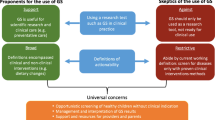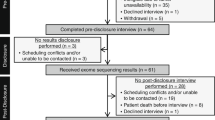Abstract
With widespread genomic sequencing research efforts, there is increasing impetus to return results to participants. Parents of healthy children are increasingly asked to participate in genomic research, yet there are limited studies of parental expectations for the return of results amongst healthy children. We explored parental attitudes towards their healthy children’s participation in genomic research and expectations for return of results. Data collection involved semi-structured telephone interviews with parents of healthy children participating in a primary care research network. Transcripts were analyzed thematically using constant comparison. A total of 26 parents were interviewed: 22 were female, 19 self-reported as White/European, and 20 were aged 30–39. Three themes emerged: (1) Reciprocity; Parents preferred to receive medically actionable, childhood-onset results and expected recontact overtime in exchange for their research participation. (2) Downstream impacts of testing; Parents expected future clinical benefits but were concerned about the risk of genetic discrimination. (3) Power and empowerment; Some parents felt empowered to take preventative action for their child and relatives, while others did not want to limit their child’s autonomy. Considering these tensions may help to inform participant-centered approaches to optimize parental decision-making and participation, as well as maximize the utility of results.
This is a preview of subscription content, access via your institution
Access options
Subscribe to this journal
Receive 12 print issues and online access
$259.00 per year
only $21.58 per issue
Buy this article
- Purchase on Springer Link
- Instant access to full article PDF
Prices may be subject to local taxes which are calculated during checkout
Similar content being viewed by others
Data availability
Redacted transcripts are available on request.
References
Kalia SS, Adelman K, Bale SJ, Chung WK, Eng C, Evans JP, et al. Recommendations for reporting of secondary findings in clinical exome and genome sequencing, 2016 update (ACMG SF v2.0): a policy statement of the American College of Medical Genetics and Genomics. Genet Med. 2017;19:249–55.
Van El CG, Cornel MC, Borry P, Hastings RJ, Fellmann F, Hodgson SV, et al. Whole-genome sequencing in health care: recommendations of the European Society of Human Genetics. Eur J Hum Genet. 2013;21:580–4.
Boycott K, Hartley T, Adam S, Bernier F, Chong K, Fernandez BA, et al. The clinical application of genome-wide sequencing for monogenic diseases in Canada: Position Statement of the Canadian College of Medical Geneticists. J Med Genet. 2015;52:431–7.
Jarvik GP, Amendola LM, Berg JS, Brothers K, Clayton EW, Chung W, et al. Return of genomic results to research participants: The floor, the ceiling, and the choices in between. Am J Hum Genet. 2014;94:818–26.
Lewis ACF, Knoppers BM, Green RC. An international policy on returning genomic research results. Genome Med. 2021;13:1–3.
Bombard Y, Brothers KB, Fitzgerald-Butt S, Garrison NA, Jamal L, James CA, et al. The responsibility to recontact research participants after reinterpretation of genetic and genomic research results. Am J Hum Genet. 2019;104:578–95.
Carrieri D, Dheensa S, Doheny S, Clarke AJ, Turnpenny PD, Lucassen AM, et al. Recontacting in clinical practice: the views and expectations of patients in the United Kingdom. Nat Publ Group. 2017;25:1106–12.
David KL, Best RG, Brenman LM, Bush L, Deignan JL, Flannery D, et al. Patient re-contact after revision of genomic test results: points to consider-a statement of the American College of Medical Genetics and Genomics (ACMG). Genet Med. 2019;21:769–71.
Zawati MH, Parry D, Knoppers BM. The best interests of the child and the return of results in genetic research: international comparative perspectives. BMC Med Ethics. 2014;15:72.
Rahm AK, Bailey L, Fultz K, Fan A, Williams JL, Buchanan A, et al. Parental attitudes and expectations towards receiving genomic test results in healthy children. Transl Behav Med. 2018;8:44–53.
Lewis MA, Stine A, Paquin RS, Mansfield C, Wood D, Rini C, et al. Parental preferences toward genomic sequencing for non-medically actionable conditions in children: A discrete-choice experiment. Genet Med. 2018;20:181–9.
Eichinger J, Elger BS, Koné I, Filges I, Shaw D, Zimmermann B, et al. The full spectrum of ethical issues in pediatric genome-wide sequencing: a systematic qualitative review. BMC Pediatr. 2021;21:1–45.
Byrjalsen A, Stoltze U, Wadt K, Hjalgrim LL, Gerdes AM, Schmiegelow K, et al. Pediatric cancer families’ participation in whole-genome sequencing research in Denmark: Parent perspectives. Eur J Cancer Care (Engl). 2018;27:1–11.
Kasparian NA, De Abreu Lourenco R, Winlaw DS, Sholler GF, Viney R, Kirk EPE. Tell me once, tell me soon: parents’ preferences for clinical genetics services for congenital heart disease. Genet Med. 2018;20:1387–95.
Tabor HK, Brazg T, Crouch J, Namey EE, Fullerton SM, Beskow LM, et al. Parent perspectives on pediatric genetic research and implications for genotype-driven research recruitment. J Empir Res Hum Res Ethics. 2011;6:41.
Sedig LK, Jacobs MF, Mody RJ, Le LQ, Bartnik NJ, Gornick MC, et al. Adolescent and parent perspectives on genomic sequencing to inform cancer care. Pediatr Blood Cancer. 2022;69:e29791.
Swanson K, Sparks TN, Lianoglou BR, Chen F, Downum S, Patel S, et al. Preference for secondary findings in prenatal and pediatric exome sequencing. Prenat Diagn. 2022;42:753–61.
Li KC, Birch PH, Garrett BM, Macphee M, Adam S, Friedman JM. Parents’ perspectives on supporting their decision making in genome-wide sequencing. J Nurs Scholarsh. 2016;48:265–75.
Werner-Lin A, Zaspel L, Carlson M, Mueller R, Walser SA, Desai R, et al. Gratitude, protective buffering, and cognitive dissonance: How families respond to pediatric whole exome sequencing in the absence of actionable results. Am J Med Genet A. 2018;176:578–88.
Blumling AA, Prows CA, Harr MH, Chung WK, Clayton EW, Holm IA, et al. Outcomes of returning medically actionable genomic results in pediatric research. J Pers Med. 2022;12:1910.
Strauss A, Corbin JM. Basics of qualitative research: Grounded theory procedures and techniques. Basics of qualitative research: Grounded theory procedures and techniques. 270 p. Thousand Oaks, CA, US: Sage Publications, Inc; 1990.
Braun V, Clarke V. Using thematic analysis in psychology. Qual Res Psychol. 2006;3:77–101.
Thorne S, Stephens J, Truant T. Building qualitative study design using nursing’s disciplinary epistemology. J Adv Nurs. 2016;72:451–60.
Carsley S, Borkhoff CM, Maguire JL, Birken CS, Khovratovich M, McCrindle B, et al. Cohort Profile: The Applied Research Group for Kids (TARGet Kids!). Int J Epidemiol. 2015;44:776–88.
Anderson JA, Meyn S, Shuman C, Shaul Z. Parents perspectives on whole genome sequencing for their children: qualified enthusiasm? J Med Ethics. 2017;43:535–9.
Mcgowan ML, Prows CA, Dejonckheere M, Brinkman WB, Vaughn L, Myers MF. Adolescent and parental attitudes about return of genomic research results: Focus group findings regarding decisional preferences. J Empir Res Hum Res Ethics. 2018;13:371–82.
Lewis C, Sanderson S, Hill M, Patch C, Searle B, Hunter A, et al. Parents motivations, concerns and understanding of genome sequencing: a qualitative interview study. Eur J Hum Genet. 2020;28:874–84.
Pereira S, Oliver Robinson J, Gutierrez AM, Petersen DK, Hsu RL, Lee CH, et al. Perceived benefits, risks, and utility of newborn genomic sequencing in the BabySeq project. Pediatrics. 2019;143:S6–13.
Jaitovich Groisman I, Hurlimann T, Godard B. Parents of a child with epilepsy: Views and expectations on receiving genetic results from Whole Genome Sequencing. Epilepsy Behav. 2019;90:178–90.
Halley MC, Young JL, Fernandez L, Kohler JN, Bernstein JA, Wheeler MT, et al. Perceived utility and disutility of genomic sequencing for pediatric patients: Perspectives from parents with diverse sociodemographic characteristics. Am J Med Genet. 2022;188:1088–101.
Sebastian A, Carroll JC, Vanstone M, Clausen M, Kodida R, Reble E, et al. Widening the lens of actionability: A qualitative study of primary care providers views and experiences of managing secondary genomic findings. Eur J Hum Genet. 2022;30:595–603.
Hastings Ward J. Health data: when children reach the age of consent. Nat Med Nat Res. 2022;28:225.
Timmermans S, Buchbinder M. Patients-in-waiting: Living between sickness and health in the genomics era. J Health Soc Behav. 2010;51:408–23.
Johnson F, Ulph F, MacLeod R, Southern KW. Receiving results of uncertain clinical relevance from population genetic screening: systematic review & meta-synthesis of qualitative research. Eur J Hum Genet Springe Nat. 2022;30:520–31.
Bombard Y Ethical arguments regarding the return of research results. In: National Academies of Sciences, Engineering, and Medicine. National Academies Considerations for Returning Individual Genomic Results from Population-Based Surveys: Focus on the National Health and Nutrition Examination Survey: Proceedings of a Workshop [Internet]. Stone C, editor. Washington DC; The National Academic Press; 2023. https://doi.org/10.17226/27105.
Brothers KB, Vassy JL, Green RC. Reconciling Opportunistic and Population Screening in Clinical Genomics. Mayo Clin Proc. 2019;94:103–9.
Mighton C, Shickh S, Aguda V, Krishnapillai S, Adi-Wauran E, Bombard Y. From the patient to the population: Use of genomics for population screening. Front Genet. 2022;13:1–21.
Holm IA, Green RC. Implementation of Whole Genome Sequencing as Screening in a Diverse Cohort of Healthy Infants. National Library of Medicine [Internet]. 2021 Dec 3 [cited 2023 Jun 2]. Available from: https://clinicaltrials.gov/study/NCT05161169.
Berg JS, Vogel Milko L. Age-based genomic screening in newborns, infants and children: A novel paradigm in public health genomics. National Human Genome Research Institute: Advancing Genomic Medicine Research (AGMR) Program [Internet]. [cited 2023 June 9]. Available from: https://www.genome.gov/Funded-Programs-Projects/Advancing-Genomic-Medicine-Research-AGMR.
Holm IA, Agrawal PB, Ceyhan-Birsoy O, Christensen KD, Fayer S, Frankel LA, et al. The BabySeq project: Implementing genomic sequencing in newborns. BMC Pediatr. 2018;18:1–10.
Funding
This project was funded by the McLaughlin Centre (provided to YB). YB was supported by a New Investigator Award from the Canadian Institutes of Health Research and currently holds a Canada Research Chair in Genomics Health Services and Policy. YB received support for this project from the McLaughlin Centre and the New Investigator Award from the Canadian Institutes of Health Research.
Author information
Authors and Affiliations
Contributions
Conceptualization: CM, THK, MC, YB; Formal analysis: CD, CM, YB; Funding acquisition: YB; Resources (provision of participants): CK, CB, JM. Investigation: SC, CM, CDC, EJ, THK, MC; Methodology: CM, MC, YB; Project administration: THK, MC, YB; Supervision: YB, MC; Visualization: CDC; Writing original draft: CDC, CM, YB, MC; Writing-review and editing: All authors.
Corresponding author
Ethics declarations
Competing interests
The authors declare no competing interests.
Ethics approval
Ethics approval was obtained from the St. Michael’s Hospital Research Ethics Board (REB # 17-026).
Additional information
Publisher’s note Springer Nature remains neutral with regard to jurisdictional claims in published maps and institutional affiliations.
Supplementary information
Rights and permissions
Springer Nature or its licensor (e.g. a society or other partner) holds exclusive rights to this article under a publishing agreement with the author(s) or other rightsholder(s); author self-archiving of the accepted manuscript version of this article is solely governed by the terms of such publishing agreement and applicable law.
About this article
Cite this article
Di Carlo, C., Mighton, C., Clausen, M. et al. Parents’ attitudes towards research involving genome sequencing of their healthy children: a qualitative study. Eur J Hum Genet 32, 171–175 (2024). https://doi.org/10.1038/s41431-023-01476-9
Received:
Revised:
Accepted:
Published:
Issue Date:
DOI: https://doi.org/10.1038/s41431-023-01476-9



